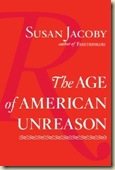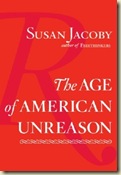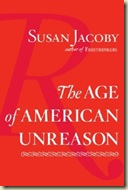The Age of American Unreason: Review Part 2
[Ed. Note: Yesterday, our one regular reader asked if we could refocus the blog into a site that "was stupid and made him laugh." We do not know how to take this request from 100% of our audience.]
 In "The Way We Lived Then: Intellect and Ignorance in a Young Nation," the second chapter of Susan Jacoby's The Age of American Unreason, Jacoby establishes the seeds of the intellectual and anti-intellectual movements in America, suggesting that this problem is not local but systemic.
In "The Way We Lived Then: Intellect and Ignorance in a Young Nation," the second chapter of Susan Jacoby's The Age of American Unreason, Jacoby establishes the seeds of the intellectual and anti-intellectual movements in America, suggesting that this problem is not local but systemic.
Predictably, Jacoby lionizes Emerson, the patron saint of American intellect. Again, Jacoby does not interrogate Emerson's message, but establishes his claims as inherently correct. Jacoby focuses on "The American Scholar," and she discusses Emerson's truly democratic concept of "Man Thinking." Emerson is worth quoting at length:
The fable [of there being One Man] implies, that the individual, to possess himself, must sometimes return from his own labor to embrace all the other laborers. But unfortunately, this original unit, this fountain of power, has been so distributed to multitudes, has been so minutely subdivided and peddled out, that it is spilled into drops, and cannot be gathered. The state of society is one in which the members have suffered amputation from the trunk, and strut about so many walking monsters, — a good finger, a neck, a stomach, an elbow, but never a man.
Man is thus metamorphosed into a thing, into many things. The planter, who is Man sent out into the field to gather food, is seldom cheered by any idea of the true dignity of his ministry. He sees his bushel and his cart, and nothing beyond, and sinks into the farmer, instead of Man on the farm. The tradesman scarcely ever gives an ideal worth to his work, but is ridden by the routine of his craft, and the soul is subject to dollars. The priest becomes a form; the attorney, a statute-book; the mechanic, a machine; the sailor, a rope of a ship.
In this distribution of functions, the scholar is the delegated intellect. In the right state, he is, Man Thinking. In the degenerate state, when the victim of society, he tends to become a mere thinker, or, still worse, the parrot of other men's thinking.
In this passage, Emerson argues against the compartmentalization of one's subjectivity into a single area defined by labor (what Emerson calls "a form"), and if we extend his thinking, we see that an individual is capable of being an intellectual, a laborer, an artisan simultaneously—Man Thinking anticipates Gramsci's notion of the organic intellectual, and the concept does not close off laborers from participating in intellectualism, nor does it argue for the reification of an elite class of intellectuals. While Emerson does not investigate any labor-based reason for one's estrangement from his or her own labor, on the majority we can say of the Man Thinking: So far, so good.
One need not look too hard at "Self Reliance," though, to see some roots of American isolationism, as well attitudes and beliefs that have worked to marginalize oppressed groups.1 Thus, by not problematizing her major argument, again Jacoby stacks the deck in her own favor, undermining her own case by either intentionally omitting what is problematic in the sources she champions or by not seeing the problems themselves. She does, however, focus on those who disagree with Emersonian self-reliance and intellectualism, painting them as antagonists to what she develops more and more as an American narrative.2
Throughout this chapter, however, Jacoby is relatively even-handed in her analysis of the parallel development of secular and non-secular school systems in the early years of the Republic, and she does an excellent job of framing the intentional omission of religion from the nation's founding documents.
And for our one reader who wants "funny":
1In Extraordinary Bodies, Rosemarie Garland Thomson posits that "Self Reliance" and its related themes directly contribute to a culture that devalues bodies with difference and ultimately ignores the reality that humans are, in fact, interdependant, not autonomous.
2In The Archaeology of Knowledge, Michel Foucault credibly argues why one must resist the impulse to narrativize when researching history. As a New Historian, Foucault would reject Jacoby's method of chronological, causal narrative outright.





